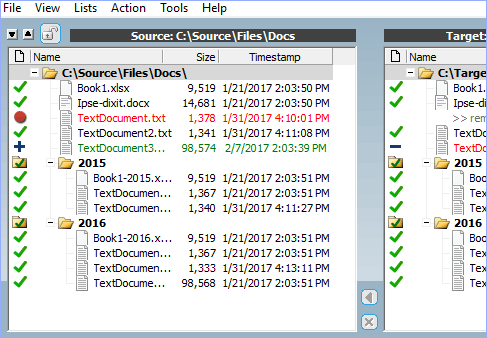

- #SYNCHRONIZE AS SOON AS CHANGES ARE MADE TO FILES SYNKRON INSTALL#
- #SYNCHRONIZE AS SOON AS CHANGES ARE MADE TO FILES SYNKRON UPDATE#
- #SYNCHRONIZE AS SOON AS CHANGES ARE MADE TO FILES SYNKRON WINDOWS#
Double-click the executable to download and install agent updates. The AfsUpdater.exe is located in the agent installation directory.
#SYNCHRONIZE AS SOON AS CHANGES ARE MADE TO FILES SYNKRON UPDATE#
Microsoft Update makes this process seamless, by automatically downloading and installing updates for you. We recommend installing every Azure File Sync update to ensure you have access to the latest fixes for the server agent. Configure Microsoft Update to automatically download and install agent updates.To learn more, see Automatic agent lifecycle management. You can select to install the latest agent version when available or update when the currently installed agent is near expiration. The Azure File Sync agent will auto-upgrade. Use Azure File Sync agent auto-upgrade feature to install agent updates.There are five approved and tested ways to install the Azure File Sync agent updates. They often contain bug fixes and smaller improvements but no new features. Minor agent versions are also called "patches" and are released more frequently than major versions.Major agent versions often contain new features and have an increasing number as the first part of the version number.We recommend updating the Azure File Sync agent as new versions are available. The Azure File Sync agent is updated on a regular basis to add new functionality and to address issues. Not Supported - Agent versions expired on October 1, 2018 Not Supported - Agent versions expired on August 19, 2019 Not Supported - Agent versions expired on November 6, 2019 Not Supported - Agent versions expired on March 18, 2020

Not Supported - Agent versions expired on April 21, 2020 Not Supported - Agent versions expired on September 1, 2020 Not Supported - Agent versions expired on January 12, 2021 Not Supported - Agent versions expired on February 16, 2021 Not Supported - Agent versions expired on June 28, 2021 Not Supported - Agent versions expired on March 28, 2022 Not Supported - Agent versions expired on May 23, 2022 Not Supported - Agent versions expired on August 8, 2022 The following Azure File Sync agent versions have expired and are no longer supported: Milestone Supported - Agent version will expire on August 1, 2023 Supported - Agent version will expire on October 2, 2023

The following Azure File Sync agent versions are supported: Milestone This article provides the release notes for the supported versions of the Azure File Sync agent. You can have as many caches as you need around the world.
#SYNCHRONIZE AS SOON AS CHANGES ARE MADE TO FILES SYNKRON WINDOWS#
You can use any protocol that's available on Windows Server to access your data locally (including SMB, NFS, and FTPS). Your Windows Server installations are transformed into a quick cache of your Azure file share. Azure File Sync allows you to centralize your organization's file shares in Azure Files without giving up the flexibility, performance, and compatibility of an on-premises file server.


 0 kommentar(er)
0 kommentar(er)
